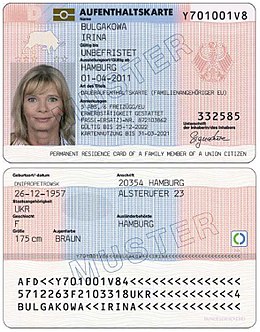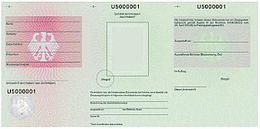Permanent residence card (Germany)
With the permanent residence card , the family member entitled to free movement of a citizen of the European Economic Area (EEA) who does not own the citizenship of an EEA state, i.e. is a so-called third - country national , proves his / her right of permanent residence in Germany .
Legal basis
The legal basis for the permanent residence card is Section 5 (5) sentence 2 Freedom of Movement Act / EU, for citizens of the EEA countries who are not also EU members (i.e. Iceland , Liechtenstein and Norway ) in addition i. V. with § 12 FreizügG / EU. These regulations are the national implementation of Articles 16 to 20 of the Union Citizens' Directive . For the basics of European law → permanent residence card .
Legal character
The permanent residence card is not a residence permit under the Residence Act , but is based on the Freedom of Movement Act / EU . The permanent residence card is of a declaratory nature, as the right of residence is based on Union law or the EEA Agreement. According to the law valid until January 28, 2013, the permanent residence card was an administrative act . Since the legislature has ordered that the permanent residence card is no longer revoked if the right of permanent residence is lost , but only withdrawn (Section 5 (6) in conjunction with Section 5 (4) sentence 1 FreizügG / EU in the January 29, 2013 current version) could also be seen in the change of terminology at the same time a change in the legal character (no more administrative act, but only identification).
requirements
Family members of EEA citizens who are not EEA citizens have a right of permanent residence if they have been legally resident in Germany with the EEA citizen for five years ( Section 4a (1) sentence 2 FreizügG / EU).
Under certain conditions, the right of permanent residence arises earlier (Section 4 a (3) FreizügG / EU): Family members of a deceased EEA citizen who was employed or self-employed and who had their permanent residence with him at the time of his death have the permanent right of residence, if
- the EEA citizen has been in the federal territory for at least two years at the time of his death,
- the EEA citizen has died as a result of an accident at work or an occupational disease, or
- the surviving spouse or life partner of the EEA citizen is German according to Article 116 of the Basic Law or lost this legal status by marrying the EEA citizen before March 31, 1953; this regulation is only relevant for the children of the EEA citizens or of the spouse who are not EEA citizens themselves.
If the EEA citizen acquired the right of permanent residence before the expiry of five years (e.g. in accordance with Section 4 a (2) FreizügG / EU), family members also acquire it earlier (Section 4 a (4) FreizügG / EU).
Family members of EEA citizens who separated from the EEA citizen in the first five years of their stay in Germany (divorce) or whose marriage was dissolved due to the death of the EEA citizen are granted the right of permanent residence if they have legally stayed for five years reside in Germany (Section 4 a (5) FreizügG / EU).
EEA citizens entitled to free movement will not be issued a permanent residence card; you will receive a certificate of permanent residence .
Citizens of Switzerland also do not receive a permanent residence card. On the basis of the EU-Switzerland Free Movement Agreement of June 21, 1999, you will still have a residence permit with the special entry Swiss residence permit .
Procedure
The permanent residence card must be issued within six months of the application (Section 5 (5) sentence 2 FreizügG / EU).
Loss of permanent residence
Permanent residence is not affected (that is, periods of absence are equated with periods of presence)
- Absences up to a total of six months a year or
- Absence to do military service or alternative service as well
- a one-off absence of up to twelve consecutive months for an important reason, in particular due to pregnancy and childbirth, serious illness, studies, vocational training or a professional posting (Section 4 a (5) FreizügG / EU).
An absence of more than two consecutive years for a reason that is by its nature not just temporary leads to the loss of the right of permanent residence (Section 4 a (7) FreizügG / EU).
In addition, the right of permanent residence is not lost if the EEA citizen or the family member who no longer lives with the EEA citizen loses the status of an employee or self-employed person. A right of permanent residence that has arisen can - apart from cases of deception and fraud i. S. of § 2 Abs. 7 FreizügG / EU - can only be withdrawn for reasons of public order, security or health ( § 6 Abs. 1 FreizügG / EU). The so-called loss determination procedure goes much further in its effects than a determination of the loss of freedom of movement due to a lack of employee or self-employed status: The person concerned is required to leave the country and is not allowed to re-enter the federal territory. A re-entry and a stay in the federal territory are punishable ( § 9 FreizügG / EU in conjunction with § 7 Abs. 2 FreizügG / EU). The effects of the determination of loss correspond to those of expulsion under the Residence Act . In order to be able to re-enter Germany, the entry ban must be limited in time.
The loss assessment for reasons of public health can only be made if the illness occurs within the first three months after entry (Section 6, Paragraph 1, Clause 3 FreizügG / EU). The fact of a criminal conviction alone is not enough to determine the loss. There must be an actual and sufficiently serious threat that affects a basic interest of society (Section 6 (2) FreizügG / EU). This formulation corresponds to the very high level of deportation protection that applies to EEA citizens.
When making the decision, the length of stay of the person concerned in Germany, their age, their state of health, their family and economic situation, their social and cultural integration in Germany and the extent of their ties to the country of origin must be taken into account (Section 6 (3) FreizügG / EU).
The invalidation of the national passport, identity card or other passport substitute cannot justify termination of the stay (Section 6 (7) FreizügG / EU). The requirements are therefore very high and are rarely met in practice.
Permit for permanent residence in the EU
The permanent residence card should not be confused with the permit for permanent EU residence . This permit is a regular residence permit under the Residence Act , which is issued to nationals from non-EEA countries who do not enjoy freedom of movement under European law .
A prerequisite for this permit is, among other things, a legal residence of at least five years in the federal territory. The EU long-term residence permit is linked to a right of residence in Germany, but also in the other member states of the European Union - except Denmark , Great Britain and Ireland .
This permit is based on the Permanent Residence Directive 2003/109 / EC, which has been implemented in Germany by § § 9a , § 9b and § 9c AufenthG.
Anyone who has the right of permanent residence in another member state of the European Union according to the aforementioned directive will also receive a German residence permit upon application ( Section 38a of the Residence Act).
Form of grant, costs
Since September 1, 2011, the permanent residence card has been issued as an electronic residence permit in credit card format. A fee of EUR 28.80 is charged for issuing a permanent residence card, and EUR 22.80 for persons under 24 years of age ( Section 47 subs. 3 AufenthV).
Web links
- Freedom of Movement Act / EU
- General administrative regulation for the Freedom of Movement Act / EU
- Directive 2004/38 / EC (Union Citizens' Directive) (PDF)in the consolidated version of June 16, 2011, PDF doc. (250 kB), accessed on January 13, 2013.
Individual evidence
- ↑ Federal Ministry of the Interior: General administrative regulation for the Freedom of Movement Act / EU ( Memento of the original from January 5, 2011 in the Internet Archive ) Info: The archive link was automatically inserted and not yet checked. Please check the original and archive link according to the instructions and then remove this notice. No. 5.2.1 of October 26, 2009, accessed on November 21, 2011.
- ↑ Permit for permanent residence on the ground floor. Retrieved March 30, 2014 .


